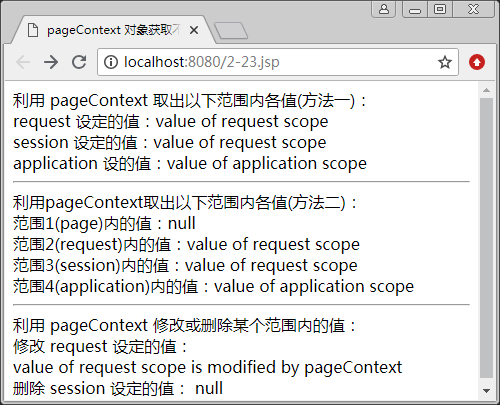
JSP教程
JSP 的内置对象还包括 pageContext、page、config,在接下来的教程中我们将介绍这些内置对象的语法与应用。
pageContext 是页面上下文对象,这个特殊的对象提供了 JSP 程序执行时所需要用到的所有属性和方法,如 session、application、config、out 等对象的属性,也就是说,它可以访问本页所有的 session,也可以取本页所在的 application 的某一属性值,它相当于页面中所有其他对象功能的集大成者,可以用它访问本页中所有的其他对象。
pageContext 对象是 javax.servlet:jsp.pageContext 类的一个实例,它的创建和初始化都是由容器来完成的,JSP 页面里可以直接使用 pageContext 对象的句柄,pageContext 对象的 getXxx()、setXxx() 和 findXxx() 方法可以根据不同的对象范围实现对这些对象的管理。表 1 列出了 pageContext 对象的常用方法。
表1 pageContext对象的常用方法
|
方法 |
说明 |
|---|---|
|
void forward(String relativeUrlPath) |
把页面转发到另一个页面或者 Servlet 组件上 |
|
Exception getException() |
返回当前页的 Exception 对象 |
|
ServletRequest getRequest() |
返回当前页的 request 对象 |
|
ServletResponse getResponse() |
返回当前页的 response 对象 |
|
ServletConfig getServletConfig() |
返回当前页的 ServletConfig 对象 |
|
HttpSession getSession() |
返回当前页的 session 对象 |
|
Object getPage() |
返回当前页的 page 对象 |
|
ServletContext getServletContext() |
返回当前页的 application 对象 |
|
public Object getAttribute(String name) |
获取属性值 |
|
Object getAttribute(String name,int scope) |
在指定的范围内获取属性值 |
|
void setAttribute(String name,Object attribute) |
设置属性及属性值 |
|
void setAttribute(String name,Object obj,int scope) |
在指定范围内设置属性及属性值 |
|
void removeAttribute(String name) |
删除某属性 |
|
void removeAttribute(String name,int scope) |
在指定范围内删除某属性 |
|
void invalidate() |
返回 servletContext 对象,全部销毁 |
pageContext 对象的主要作用是提供一个单一界面,以管理各种公开对象(如 session、application、config、request、response 等),提供一个单一的 API 来管理对象和属性。
例1:通过 pageContext 对象取得不同范围的属性值,代码如下:
<%@ page contentType="text/html;charset=utf-8" %>
<html>
<head>
<title>
pageContext 对象获取不同范围属性
</title>
</head>
<body>
<%
request.setAttribute("info","value of request scope");
session.setAttribute("info","value of request scope");
application.setAttribute("info","value of application scope");
%>
利用 pageContext 取出以下范围内各值(方法一):<br>
request 设定的值:<%=pageContext.getRequest().getAttribute("info") %> <br>
session 设定的值:<%=pageContext.getSession().getAttribute("info") %> <br>
application 设的值:<%=pageContext.getServletContext().getAttribute("info") %> <hr>
利用pageContext取出以下范围内各值(方法二):<br>
范围1(page)内的值:<%=pageContext.getAttribute("info",1) %> <br>
范围2(request)内的值:<%=pageContext.getAttribute("info",2) %> <br>
范围3(session)内的值:<%=pageContext.getAttribute("info",3) %> <br>
范围4(application)内的值:<%=pageContext.getAttribute("info",4) %> <hr>
利用 pageContext 修改或删除某个范围内的值:
<% pageContext.setAttribute("info","value of request scope is modified by pageContext",2); %> <br>
修改 request 设定的值:<br>
<%=pageContext.getRequest().getAttribute("info") %> <br>
<% pageContext.removeAttribute("info"); %>
删除 session 设定的值:<%=session.getAttribute("info") %>
</body>
</html>
运行结果如图 1 所示。

图1 通过pageContext对象取得不同范围的属性值
提示:
pageContext 对象在实际 JSP 开发过程中很少使用,因为 request 和 response 等对象可以直接调用方法进行使用,而通过 pageContext 来调用其他对象,会觉得有些麻烦。